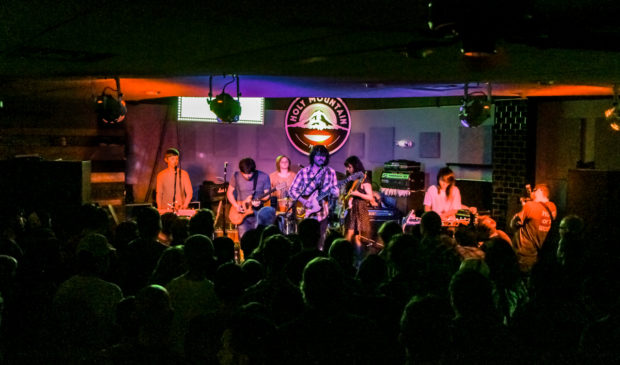Saving Austin music with words, if not dollars
Monday, September 19, 2016 by
Chad Swiatecki Of the many long looks, panel discussions and reports that have examined the fragile state of Austin’s music economy and culture over the past 18 months, few were as fortunately timed as last week’s guest lecture/panel event “The Crisis in Music: Austin Edition.”
Organized by the Front Porch public church group and held at All Saints’ Episcopal Church, the gathering took place Thursday evening mere hours after City Council hammered out the final details of its next budget.
The financial backing in next year’s budget would be vital to carrying out most of the ambitious steps outlined in Mayor Steve Adler’s Austin Music and Creative Ecosystem Omnibus, which is the grandest plan from the city level to fix a music community that has lost 1,200 jobs in the last five years and is ailing in other ways as well.
Adler was among the panelists at Thursday’s event, but the main attraction was a speech of just over an hour from jazz historian and author Ted Gioia, who was in town promoting his latest book and spoke about the parallels between Austin’s present situation and similar inflection points faced in other cities with storied musical traditions.
Offering a cautionary tale of the jazz branding turf war going on between New Orleans and Kansas City – despite historical jazz landmarks in New Orleans being neglected and left to urban blight – Gioia warned of the harmfulness of symbolic actions by communities without substantive policy and economic efforts to back them up.
Of course, one big reason Austin musicians and all others are hurting is because almost limitless access to free music has sliced record sales by more than half. Music available on streaming platforms such as YouTube and Spotify has made it almost impossible to get millennials and many other demographics to pay for music, which Gioia said results in artists working hard to give away as much free material as they can in hopes of gaining new fans.
At times, the historian’s economic arguments became jumbled, conflating the motivations behind the business success of a well-made television series like HBO’s Game of Thrones with people’s refusal to pay for “dumbed down” AutoTune-laden music that’s available virtually everywhere. It was an argument that confused content quality with limited access as the main driver of financial success, since HBO and other premium channels win by tightly restricting where their shows can be seen and charging a subscription for access.
A better music parallel was drawn by a panelist regarding the decision by pop singer Adele not to make her 2015 album, 25, available on streaming services upon its fall release. That decision and the public’s demand for her music helped the album sell more than 3 million copies its first week, a rare bright spot for the music industry.
Looking for answers, Gioia noted that new technology tends to turn into a positive for the music industry in the long run and said that Austin’s vibrant music and technology communities make it the one U.S. city with the best shot at developing the next transformative musical technology.
Of course for that to happen in Austin, music tech hopefuls would have to shake off the albatrosses that the larger investment community sees draped around the necks of music startups as a whole.
After Gioia’s speech, Adler and other panelists offered their thoughts and fired questions at the guest, with Gioia and local club owner Will Bridges hashing out the pros and cons of Austin’s being a live music town instead of a record industry town like New York City or Los Angeles.
If those panelists and the hundred or so audience members in attendance were expecting Council to deliver on the items in the omnibus – which had seen its priority list whittled down in the months following its unveiling – they woke up Friday wishing for more.
A memo from Adler prior to Thursday’s approval of the city’s $3.7 billion budget for Fiscal Year 2016-2017 outlined expansion of an assistance fund for music and arts venues in crisis (which utilizes funding left over from a similar though more narrowly focused fund in the current year’s budget) along with the addition of two full-time staffers to the entertainment services department, and funding for efforts to help musicians bring in more revenue. The total funding for those efforts came to $475,000.
Photo by Bryan C. Parker, made available by a Creative Commons license.
The Austin Monitor’s work is made possible by donations from the community. Though our reporting covers donors from time to time, we are careful to keep business and editorial efforts separate while maintaining transparency. A complete list of donors is available here, and our code of ethics is explained here.
You're a community leader
And we’re honored you look to us for serious, in-depth news. You know a strong community needs local and dedicated watchdog reporting. We’re here for you and that won’t change. Now will you take the powerful next step and support our nonprofit news organization?



